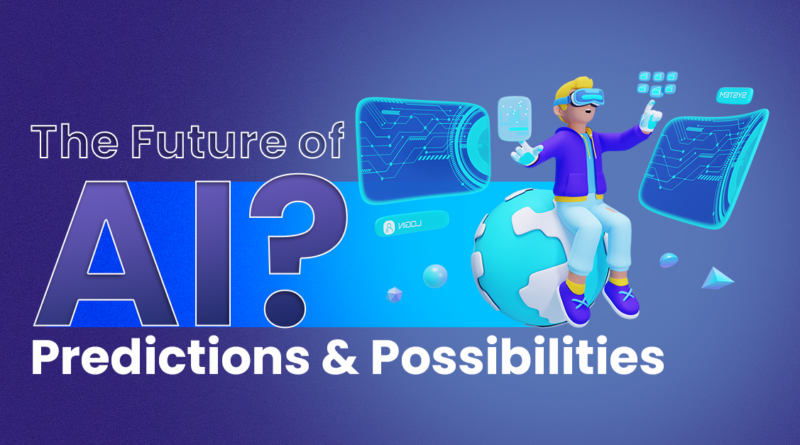The Future of AI: Predictions and Possibilities
Artificial Intelligence (AI) is a rapidly growing field that has been transforming the way we interact with technology and each other.
In recent years, we have seen remarkable advancements in AI technology that have brought us closer to the realization of autonomous systems, intelligent robots, and machines capable of performing complex tasks.
With the increasing use of AI in various industries, it’s becoming clear that the future of AI is full of predictions and possibilities that are both exciting and daunting.
In this blog, we’ll explore some of the predictions and possibilities of AI, from its potential impact on employment and the economy to the ethical considerations that come with the development of intelligent machines. But if you want to learn AI in detail, we suggest that you may enroll in one of the best AI Course.
Table of Contents
Impact on Employment
One of the primary ways that AI will impact employment is through automation. AI can automate many tasks that were previously done by humans, such as data entry, customer service, and manufacturing.
As a result, some jobs that involve repetitive or routine tasks are at risk of being replaced by machines. For example, the use of AI-powered robots in manufacturing can replace human workers in assembly line jobs.
However, AI can also create new jobs that involve working with or alongside AI systems. For instance, the development, maintenance, and programming of AI systems will require highly skilled workers.
Additionally, the implementation of AI in various industries, such as healthcare and finance, will require experts who understand both the technology and the industry.
Another way that AI can impact employment is by changing the nature of jobs. AI can augment the capabilities of human workers, allowing them to perform tasks more efficiently and accurately.
For instance, AI-powered tools can help doctors diagnose diseases more accurately, or help lawyers conduct legal research more quickly. This can lead to the creation of new roles, such as “AI-augmented” doctors or lawyers, who work alongside AI tools to improve their work.
Economic Implications
AI can automate many tasks that were previously done by humans, leading to increased efficiency and productivity.
For example, AI-powered robots in manufacturing can produce goods at a faster rate than human workers, leading to increased output and potentially lower prices for consumers.
In addition, AI can help businesses optimize their operations, leading to increased efficiency and reduced costs.
Another economic implication of AI is its impact on employment. As mentioned in the previous answer, AI has the potential to automate some jobs and industries, leading to job displacement.
However, AI can also create new jobs and industries, particularly in the development and implementation of AI technology. Additionally, the augmentation of human labor by AI can improve the productivity and efficiency of workers, leading to increased job satisfaction and potentially higher wages.
The development and implementation of AI can also have implications for innovation and economic growth. AI has the potential to spur innovation by enabling new products, services, and business models.
Advancements in Healthcare
One of the major benefits of AI in healthcare is the ability to analyze vast amounts of data quickly and accurately.
AI algorithms can be trained to recognize patterns in medical images, such as X-rays, CT scans, and MRIs, that are too subtle for the human eye to detect. This can lead to earlier and more accurate diagnoses, which in turn can improve patient outcomes.
In addition to image analysis, AI can also be used to analyze patient data from electronic health records (EHRs) and other sources.
By analyzing this data, AI algorithms can identify risk factors for certain diseases and conditions, allowing healthcare providers to take proactive measures to prevent or treat them. For example, AI can be used to identify patients who are at high risk of developing diabetes and recommend lifestyle changes or other interventions to prevent the disease.
Another area where AI is expected to make significant advancements in healthcare is in the development of new drugs and therapies.
AI algorithms can be trained to analyze vast amounts of data on the structure and function of proteins and other molecules, which can help researchers identify new targets for drug development.
AI can also be used to simulate the effects of different drugs on the human body, which can speed up the drug development process and reduce the need for animal testing.
Autonomous Vehicles
The development of autonomous vehicles is one of the most exciting areas of AI. Autonomous vehicles have the potential to reduce accidents, improve traffic flow, and reduce the cost of transportation. Some of the predictions regarding autonomous vehicles include:
The widespread adoption of autonomous vehicles, resulting in a reduction in accidents and traffic congestion.
The potential for autonomous vehicles to transform the transportation industry, leading to new business models and job opportunities.
The ethical considerations of autonomous vehicles, including the potential for accidents and the responsibility for decision-making.
Ethical Considerations:
The development of AI raises many ethical considerations, from the responsibility of AI developers to the impact on society as a whole. Some of the ethical considerations regarding AI include:
The responsibility of AI developers to ensure that AI systems are designed and implemented in an ethical and responsible manner.
The potential for AI to perpetuate bias and discrimination, particularly in areas such as hiring and lending.
The potential for AI to be used for malicious purposes, such as cyber attacks and surveillance.
Conclusion
The future of AI looks incredibly promising with limitless possibilities. As technology continues to advance, we can expect AI to transform every aspect of our lives, from healthcare and transportation to education and entertainment. While there are valid concerns about the ethical and societal implications of AI, the potential benefits cannot be ignored. As we move forward, it is crucial that we continue to explore the possibilities of AI while also considering its impact on our society as a whole. With responsible development and deployment, AI has the potential to solve some of the world’s most pressing challenges and create a better future for all.




